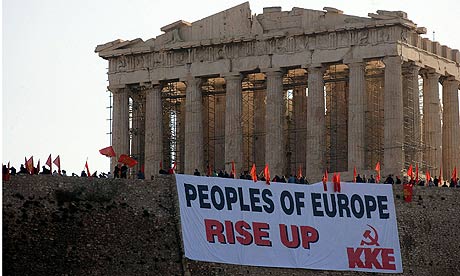Greece's €110bn bailout gets lukewarm reception from financial markets
• Markets fear deal will not cover Greece's borrowing needs
• German minister: Greece could need more money
• Cost of insuring Greek, Spanish and Portuguese debt rises

Members of Communist Party of Greece (KKE) protest on the Acropolis hill today against the IMF bailout, and its associated austerity measures. Photograph: Milos Bicanski/Getty Images
The €110bn (£95bn) Greek rescue package hammered out over the weekend has failed to impress the financial markets, amid concern that the deal will not satisfy Greece's needs.
German economy minister Rainer Brüderle added to the uncertainty by telling Reuters that the €110bn package was not intended to cover Greece's entire financial requirements for the next three years. Instead, Brüderle suggested, Greece will need to return to the financial markets in perhaps 18 months to satisfy its borrowing needs.
Brüderle's warning helped to knock the Greek banking sector down by almost 6% today in Athens, where public sector workers began a two-day strike in protest at the austerity measures demanded by the International Monetary Fund.
The cost of insuring Greek debt from default rose, wiping out some of Monday's falls. Spanish and Portuguese credit default swaps (CDSs) were also up, showing there was still concern that the crisis would spread from Athens to the eurozone's weaker members.
European leaders are due to meet on Friday to finalise the package, which is meant to bring stability to the eurozone. But there was little optimism in the currency markets, where the euro fell three-quarters of a cent against the dollar to $1.3113 this morning. Yields on Greece's government bonds also failed to return to their pre-crisis levels, with investors continuing to demand a high premium for holding Greek debt.
Germany continued to take a tough line against Greece, having finally agreed to contribute €22bn to the rescue effort. Finance minister Wolfgang Schäuble said that Greece would be plunged into insolvency if it failed to meet its promises to raise taxes across the economy, increase the retirement age to 65, and cut the size of its public sector.
"If there are any violations, payments will be stopped. Then Athens will once again be threatened with bankruptcy," Schäuble told the Rheinische Post newspaper.
Shortly before midday, the credit default swap on Greek five-year bonds rose to 674 basis points (bps), from 646.5 in New York trading last night. Spanish five-year credit default swaps rose to 166.4bps, from 157.7bps while their Portuguese equivalent rose to 281.8bps from 275.3bps.
The gap between the yield on German 10-year bonds and their Portuguese and Spanish equivalents also rose today.

No comments:
Post a Comment